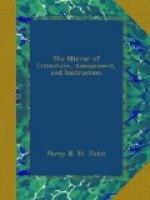Mr. Grey’s opposition to Mr. Pitt’s measures continued unabated for many years, while he remained equally steady in his attachment to Mr. Fox. His bitter hostility to the union between Ireland and England may be said to have produced one of his most celebrated speeches. Neither was he dazzled, nor misled by the splendid talents of Burke, at this time in highest repute. When Mr. Fox was deserted by Lords Fitzwilliam, Carlisle, and other alarmists, Mr. Grey unchangingly adhered to him; and when Mr. Fox and Lord Grenville formed a Whig ministry, in 1806, Mr. Grey, then, by his father’s elevation to the peerage, become Lord Howick, was appointed First Lord of the Admiralty, and one of the Cabinet Council. He next succeeded Mr. Fox as Secretary for Foreign Affairs, and leader in the House of Commons. This ministry was ill-formed, and wanted unity of purpose: their abolition of the Slave Trade was a redeeming measure, in which Lord Howick bore a conspicuous part; but his lordship’s motion for the emancipation of the Catholics brought about his dismissal from the ministry.
Lord Howick, soon after, by the death of his father, succeeded to the title of Earl Grey; and by the death of his uncle, Sir Henry Grey, to the family estate. Ill health, for a time, kept his lordship from public life: he retired with no place but that of a Governor of the Charter House, and without pension or sinecure. Upon the resignation of the Duke of Portland, in 1809, his successor, Mr. Perceval, proposed a coalition with Lords Grenville and Grey, which was at once rejected by the latter. In the following year, his lordship “felt it his duty to arraign and to expose the gross mismanagement of the government, and their repeated and dangerous misconduct,” in Parliament. In the same session, he charged the lord chancellor (Eldon) with a crime little short of treason, in having set the great seal, in 1801 and 1804, to commissions for giving the royal assent to several bills, whilst the King was in a state of mental infirmity, under medical care, and subject to personal control. The motion was negatived by a majority of 189 to 64; “but Lord Eldon has not forgotten the accusation, or forgiven the mover."[4] In 1812, another attempt was made to bring Lord Grey, with Lord Grenville, into the cabinet; but this was rejected as promptly as before.
[4] Life and Reign of George
IV. by William Wallace, Esq. 3 vols.
1831.
Lord Grey again retired to private life. In 1817, his lordship reappeared, and moved an amendment to the parliamentary address to the throne, urging rigid economy, retrenchment, and an inquiry into the state of the nation. In the same year he brought before the House of Lords, the notable circular of Lord Sidmouth for the prosecution of libels by magistrates. “It is a singular fact,” observes an acute historical writer,[5] “that Lord Grey, on this occasion, made an able and erudite law argument; which all the law lords, including Lord Ellenborough, made vain efforts to refute; and which Lord Ellenborough had the manliness to eulogize;” notwithstanding which Lord Grey’s motion for a copy of the opinion of the law officers of the crown was negatived.




